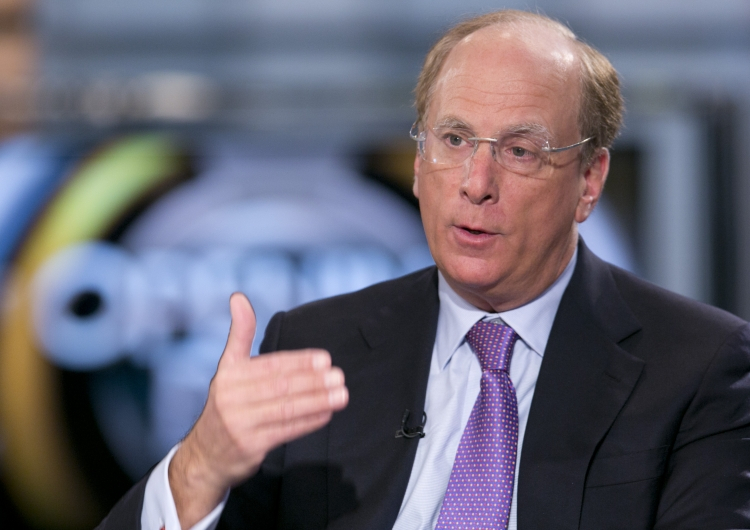Above, Michael R. Bloomberg, the media mogul and philanthropist, who chairs a climate group pressuring businesses -- ones his Bloomberg journalists cover -- to report ESG data via Bloomberg's proprietary tools.
Part of RealClearInvestigations' Guide
to Politicized Capitalism
(Home page and overview here)
On This Page: Three Key Forces in Woke Capitalism.
(See also: Three Key Opponents)
1. Larry Fink

Chief executive of BlackRock, the world’s largest asset manager, Fink, a devotee of “environmental, social, and governance” (ESG) business principles, uses his firm’s substantial clout to influence the entire corporate marketplace as well as the federal government. BlackRock urges the adoption of ESG policies by companies it invests in, including on behalf of retirement funds and other investors, and divests of those that refuse. It pushes companies towards ESG in part through backing shareholder proposals and governance resolutions championing the election of like-minded corporate board members. Fink's BlackRock, several alums of which serve in the Biden administration, has lobbied for regulations including the SEC’s proposed climate risk disclosure rule. The rule takes cues from the influential Task Force for Climate Disclosure – below – of which BlackRock is a founding member.
2. Climate Pressure Groups

- TCFD, or the Task Force on Climate-Related Financial Disclosures, chaired by media mogul and philanthropist Michael R. Bloomberg, is supported by 3,000 organizations with a market capitalization over $27 trillion. It was created to “develop recommendations on the types of information that companies should disclose to support investors, lenders, and insurance underwriters in appropriately assessing and pricing a specific set of risks – risks related to climate change.” (Members, supporters.)
- Climate Action 100+: An “investor-led initiative to ensure the world’s largest corporate greenhouse gas emitters take necessary action on climate change” consisting of 700 investors, responsible for over $68 trillion in assets under management, who engage “companies on improving climate change governance, cutting emissions and strengthening climate-related financial disclosures.” (Investors, companies, investor networks.)
- Glasgow Financial Alliance for Net Zero (GFANZ): A group launched by the UN Special Envoy on Climate Action and Finance, among others, and co-chaired by the UN Special Envoy on Climate Ambition and Solutions – Michael R. Bloomberg – GFANZ is “focused on broadening, deepening and raising net-zero ambitions across the financial system and demonstrating firms’ collective commitments to supporting companies and countries to achieve the goals of the Paris Agreement.” It consists of 450 member firms from across the global financial sector, representing more than $130 trillion in assets under management and advice. (Members.)
- Net Zero Asset Managers Initiative: One of GFANZ's seven sector-specific alliances, this is an “international group of asset managers committed to supporting the goal of net zero greenhouse gas emissions by 2050 or sooner, in line with global efforts to limit warming to 1.5 degrees Celsius; and to supporting investing aligned with net zero emissions by 2050 or sooner.” It consists of 273 asset managers with $61.3 trillion in assets. (Signatories, partners.)
- Net-Zero Banking Alliance: Another of GFANZ's seven sector-specific alliances, the "industry-led, UN-convened" group consists of 119 banks with $70 trillion in assets "committed to aligning their lending and investment portfolios with net-zero emissions by 2050." (Members.)
3. The Business Roundtable

In 2019, 181 members of the Business Roundtable, a group consisting of CEOs of America's leading companies today overseeing a total of 20 million employees and more than $9 trillion in annual revenue, redefined the purpose of a corporation, spurring a shift from shareholder capitalism to “stakeholder” capitalism. The action shifted priority from a strict focus on maximizing returns for stock owners to catering to entities not within corporations’ traditional purview at all, including society itself. Result: Corporate endorsements of ESG and related progressive positions on matters such as climate and “diversity, equity and inclusion.”





